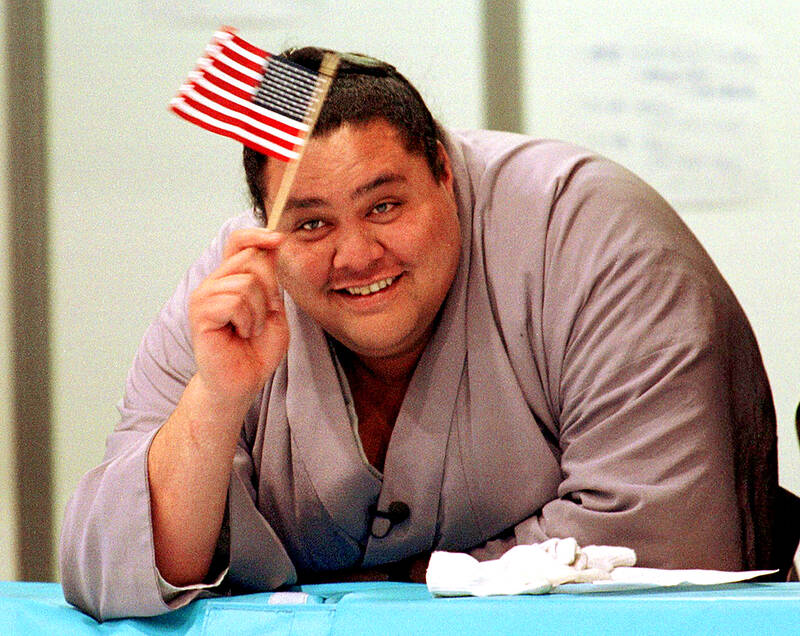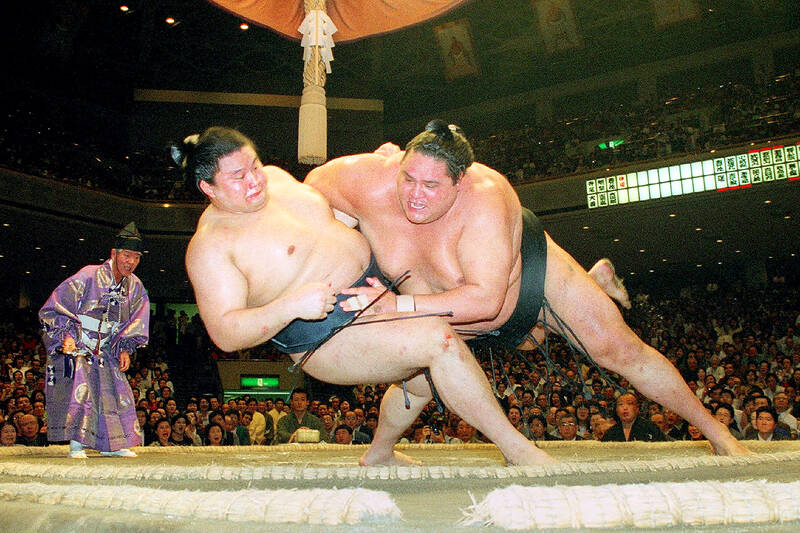Tributes have been paid in Japan to Akebono, the first foreign wrestler to reach the pinnacle of the sport of sumo, who has died aged 54.
The wrestler, who was born Chad Rowan in Hawaii, is regarded as a pioneer after he broke down cultural barriers in the centuries-old sport to become the first non-Japanese yokozuna grand champion in 1993.
He won 11 major sumo tournaments, which are held six times a year, before retiring in 2001 and turning to K-1 and professional wrestling. He was runner-up at 13 other tournaments, despite being plagued by injury.

Photo: Reuters
Japanese media said the wrestler, who took the name Taro Akebono when he became a Japanese citizen in 1996, had died of heart failure this month, citing a statement by the US Forces in Japan.
TRIBUTES PAID TO THE WRESTLER
Rahm Emanuel, the US ambassador to Japan, said he was “deeply saddened” by the news.

Photo: AFP
He said in a post on X that the wrestler, who was 203cm tall and weighed 233kg at his heaviest, was “a giant in the world of sumo, a proud Hawaiian and a bridge between the US and Japan.”
When Akebono became the first-ever foreign-born grand champion he opened the door for other foreign wrestlers to find success in the sport, Emanuel said.
“Throughout his 35 years in Japan, Akebono strengthened the cultural ties between the US and his adopted homeland by uniting us all through sport. I send my sincerest condolences to his family and friends and to sumo fans everywhere,” he said.
Akebono, who was a familiar face on Japanese TV, entered the sumo world in 1988, becoming the 64th yokozuna at the New Year tournament in Tokyo in January 1993. He became a stable master after retiring as a wrestler in 2001.
One of the heaviest and tallest rikishi, or wrestlers, in the sport’s history, Akebono and his fellow Hawaiian behemoth, the 287kg Konishiki, paved the way for a steady stream of foreign wrestlers, including five yokozuna from Mongolia.
Many sumo fans will remember Akebono for his fierce 1990s rivalry with the popular Japanese brothers and members of the sumo aristocracy, Takanohana and Wakanohana, both of whom went on to become grand champions.
Akebono is survived by his wife, daughter and two sons.

In the next few months tough decisions will need to be made by the Taiwan People’s Party (TPP) and their pan-blue allies in the Chinese Nationalist Party (KMT). It will reveal just how real their alliance is with actual power at stake. Party founder Ko Wen-je (柯文哲) faced these tough questions, which we explored in part one of this series, “Ko Wen-je, the KMT’s prickly ally,” (Aug. 16, page 12). Ko was open to cooperation, but on his terms. He openly fretted about being “swallowed up” by the KMT, and was keenly aware of the experience of the People’s First Party

Aug. 25 to Aug. 31 Although Mr. Lin (林) had been married to his Japanese wife for a decade, their union was never legally recognized — and even their daughter was officially deemed illegitimate. During the first half of Japanese rule in Taiwan, only marriages between Japanese men and Taiwanese women were valid, unless the Taiwanese husband formally joined a Japanese household. In 1920, Lin took his frustrations directly to the Ministry of Home Affairs: “Since Japan took possession of Taiwan, we have obeyed the government’s directives and committed ourselves to breaking old Qing-era customs. Yet ... our marriages remain unrecognized,

Not long into Mistress Dispeller, a quietly jaw-dropping new documentary from director Elizabeth Lo, the film’s eponymous character lays out her thesis for ridding marriages of troublesome extra lovers. “When someone becomes a mistress,” she says, “it’s because they feel they don’t deserve complete love. She’s the one who needs our help the most.” Wang Zhenxi, a mistress dispeller based in north-central China’s Henan province, is one of a growing number of self-styled professionals who earn a living by intervening in people’s marriages — to “dispel” them of intruders. “I was looking for a love story set in China,” says Lo,

Standing on top of a small mountain, Kim Seung-ho gazes out over an expanse of paddy fields glowing in their autumn gold, the ripening grains swaying gently in the wind. In the distance, North Korea stretches beyond the horizon. “It’s so peaceful,” says the director of the DMZ Ecology Research Institute. “Over there, it used to be an artillery range, but since they stopped firing, the nature has become so beautiful.” The land before him is the demilitarized zone, or DMZ, a strip of land that runs across the Korean peninsula, dividing North and South Korea roughly along the 38th parallel north. This